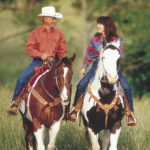Buying a first horse is a big step and not one that should be taken without a lot of thought and consideration. Weekly riding at a barn or with a private instructor is not the same as owning a living, breathing creature that will be dependent on you for its every need. Many things have to be taken into consideration before embarking on your search for the perfect horse.
 Art Explosion by Nova
Art Explosion by NovaWhere is he going to live?
You will have to give thought to where you plan on keeping your horse. If you have your own land, this probably won’t present a problem, but if, like me, you live in an urban area, you will have to find a suitable boarding facility.
Types of boarding facility
There are several different boarding arrangements available, from full-care?in a commercial barn to self-care.?You will need to weigh the savings made with a self care arrangement against the commitment necessary to go to the barn at least twice a day,?every day, to clean your horse’s stall, feed, groom and ride. And, of course, you will need to purchase feed, hay and bedding and have the means to transport and store them.
Advantages of Self-Care
When I got my first horse, I opted for the self-care arrangement and found it very rewarding, if extremely hard work. I revelled in the fact that I was up at the crack of dawn before the birds were even awake, ready to feed my horse, clean his stall and turn him out to pasture for the day before heading back home to get ready for work. I relished those quiet times with my horse, with no one else around, before setting off for my hectic job.
I, like many experienced horse owners, preferred being totally in charge of my horse’s well-being. Being able to select what I fed the horse according to his needs was certainly a plus. And also being the one doing the cleaning meant there was no need to worry that someone wasn’t doing something right.
Disadvantages of Self-Care
However, the weekly trips to the feed store to stock up on feeds and the regular trips to load up with hay and shavings meant that our poor truck was never quite the same again.
One way around this is to share the hauling and storing with?other horse owners using the same, or even nearby, facilities. If one of you has a heavy duty truck, or perhaps a trailer, you can pool funds and buy in bulk.
For the novice horse owner, self-care can be a lonely option, especially if you are, as I was, the lone boarder. Having other, experienced people around can be a great help if you have a question, or if you can’t get to the barn to feed? because of illness or vacations.
Advantages of Full-Care
The obvious advantage is?saving?time. With your horse being cared for by someone else it will not be necessary for you to go to the stables as often. You will be able to go on vacation and know that he is being?looked after.
Full-care has many different connotations. It can mean just the basic stall cleaning, feeding and turn-out. Or it can mean daily grooming, schooling, vet care and show preparation. Discussions with the barn manager before you sign a contract will mean that you know exactly what to expect.
Whichever options you choose, the chances are you will no longer have to haul hay, feed and shavings. Barns usually buy in a large enough quantity that the merchants they buy from will deliver direct to the barn.
Full care facilities often have professional instructors, vets and farriers closely associated with them, making it easier to use their services.
Disadvantages of Full-Care
The obvious disadvantage is the added cost. Generally speaking, it costs a lot more to have your horse at full-care than at self-care (even when you add in your feed, hay, bedding and transportation costs).
Another thing to consider is that to a certain extent you are no longer in control. Most commercial stables have a certain way of doing things. They may use only certain preferred feeds or you may be expected to use their own vet or farrier. The barn may be closed at certain times or the turnout facilities may not be what you would consider to be ideal.
Again, talking in depth to the barn manager will let you know exactly what to expect and let you know how flexible they are willing to be. I personally came to an arrangement with the owners of the barn where I keep my horse so that?he is kept out most of the time and brought in for meals and in bad weather. This arrangement closely matches the routine I had when I kept him at self-care.





